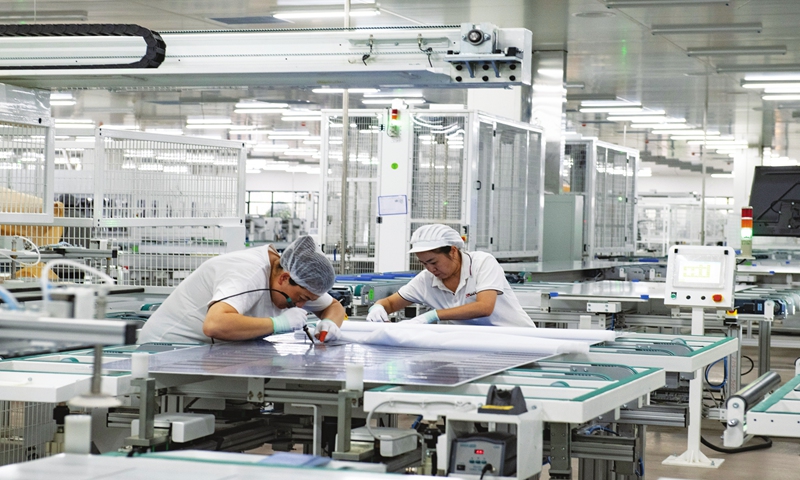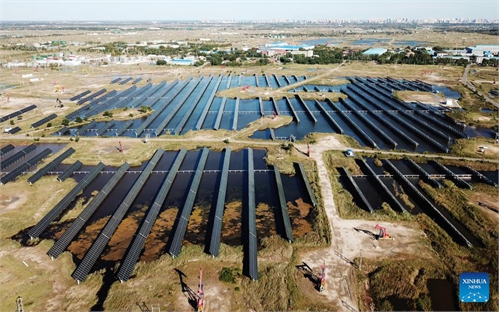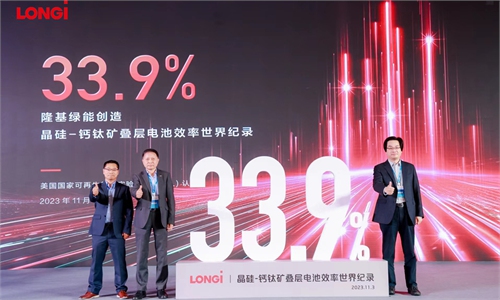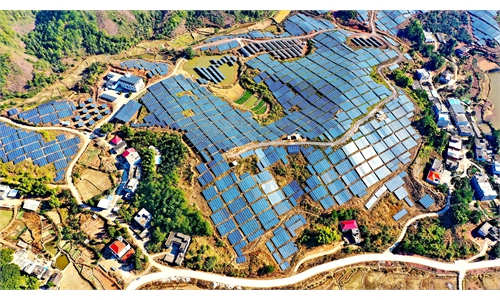
Workers are busy filling orders for solar photovoltaic modules on a production line in Jinhua, East China's Zhejiang Province on November 8, 2023. Photo: VCG
Efforts by some US politicians to raise tariffs on Chinese solar modules are just another case of campaign politics getting in the way of normal economic cooperation between China and the US, and would hurt the interests of US consumers and the development of the US clean-energy industry, Chinese analysts warned.
A bipartisan quartet of senators, led by two Democrats from the swing state of Georgia, are asking the Biden administration to toughen up tariffs on Chinese solar panels or face a glutted market, just as the president's clean-energy tax credits hit the market, the New York Times reported.
Supporters to the proposal include Marco Rubio, a Republican senator from Florida.
The proposals claim that China's advantage in solar panels comes from "aggressive subsidies" and poses an "existential threat to the US solar industry and American energy security."
Chinese analysts said that the case was one more example of some US politicians meddling with normal bilateral trade and economic cooperation by playing their "tough on China" card during a presidential election year.
These politicians have no regard to their proposals being a risk to the development of the US clean-energy industry or to the interests of US companies and ordinary users, the analysts said.
The US Inflation Reduction Act of 2022, which features unilateralism and protectionism, has aroused many protests around the world, including by many US allies.
An industry insider, who declined to be identified, told the Global Times on Tuesday that the proposals may be associated with the recent closures of some US solar companies due to their inability to compete.
"But from the point of view of consumers, they will always choose products that offer the best technology and cost performance," the industry insider pointed out.
Lin Boqiang, director of the China Center for Energy Economics Research at Xiamen University, told the Global Times on Tuesday that it is normal for some politicians to call for an increase in tariffs out of the need to protect manufacturing industries within their states.
However, it is unlikely that the Biden administration will adopt these proposals, for competitively priced Chinese solar products are making sound contributions to the US clean-energy drive.
A number of US solar companies are challenging the Biden administration's moratorium blocking tariffs on some panels imported from Southeast Asia through early June in a bid to sustain domestic renewable power development, Bloomberg reported on January 5. Many such imports are associated with Chinese manufacturers.
Zhou Mi, a senior research fellow at the Chinese Academy of International Trade and Economic Cooperation, agreed. "The whole supply chain advantage of Chinese solar products is difficult for US companies to match," Zhou told the Global Times on Tuesday.
"Raising tariffs on Chinese solar products will not only mean that US downstream companies will have to use more expensive substitutes but will also be robbed of the chance to enjoy the technological upgrades offered by industry-leading Chinese solar manufacturers."
China's solar photovoltaic manufacturing capacity has driven module prices down significantly and made solar installations more competitive with regulated power prices, according to a report by the International Energy Agency.
In recent years, China has made notable progress in developing clean energy, including solar and wind power, new-energy vehicles and nuclear energy.
Commenting on China's progress in renewable energy, Chinese Foreign Ministry spokesperson Wang Wenbin noted during a routine press conference on January 26 that "to achieve global [climate] goals, global joint efforts are required."
"In particular, favorable conditions need to be created for extensive international cooperation, and protectionism, unilateralism and politicization must be abandoned," said Wang.




